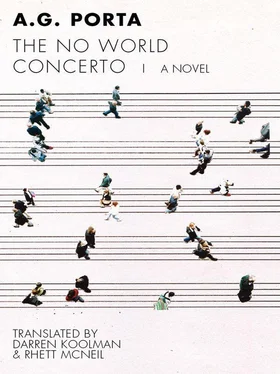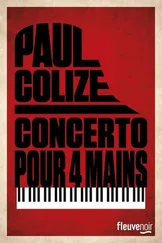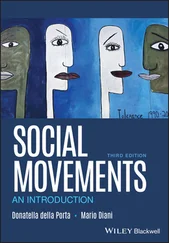A. Porta - No World Concerto
Здесь есть возможность читать онлайн «A. Porta - No World Concerto» весь текст электронной книги совершенно бесплатно (целиком полную версию без сокращений). В некоторых случаях можно слушать аудио, скачать через торрент в формате fb2 и присутствует краткое содержание. Год выпуска: 2013, Издательство: Dalkey Archive Press, Жанр: Современная проза, на английском языке. Описание произведения, (предисловие) а так же отзывы посетителей доступны на портале библиотеки ЛибКат.
- Название:No World Concerto
- Автор:
- Издательство:Dalkey Archive Press
- Жанр:
- Год:2013
- ISBN:нет данных
- Рейтинг книги:4 / 5. Голосов: 1
-
Избранное:Добавить в избранное
- Отзывы:
-
Ваша оценка:
- 80
- 1
- 2
- 3
- 4
- 5
No World Concerto: краткое содержание, описание и аннотация
Предлагаем к чтению аннотацию, описание, краткое содержание или предисловие (зависит от того, что написал сам автор книги «No World Concerto»). Если вы не нашли необходимую информацию о книге — напишите в комментариях, мы постараемся отыскать её.
, Vila-Matas's
, and Marías's
is a many-layered puzzle concerning an old screenwriter who has holed up in a shabby hotel in a never-named but familiar city in order to write a script about his lover — a young piano prodigy who wants in turn to give up music and become a novelist, and who believes she may be in contact with creatures from another world. Ambition, lust, hate, and the need to create all combine to make up a potent depiction of youth — and age — lost in a labyrinth of their own making.
Sinister and erotic, shifting restlessly between realities, and populated by conspirators both real and imagined,
is an investigation of the limits of language, storytelling, and the known world, set against a backdrop of empty concert halls and hazy foosball bars. It is the first of A. G. Porta's books to appear in English, finally joining those of his early writing partner and devotee Roberto Bolaño.
No World Concerto — читать онлайн бесплатно полную книгу (весь текст) целиком
Ниже представлен текст книги, разбитый по страницам. Система сохранения места последней прочитанной страницы, позволяет с удобством читать онлайн бесплатно книгу «No World Concerto», без необходимости каждый раз заново искать на чём Вы остановились. Поставьте закладку, и сможете в любой момент перейти на страницу, на которой закончили чтение.
Интервал:
Закладка:
It can’t be the case that everything is in fact nothing, or that it’s all a dream, that we’re all made of nothing but dream-stuff. So the screenwriter thinks, who’s trying to discern the difference between dreams and nothingness, although he prefers the idea of a bubble, or something similar, floating around in space, in which we all dream our own individual dreams — some sad, some happy, others hellish, and just a few like paradise — but all of them together constituting a single collective dream, which is that same bubble floating around in space. And when we dream within the dream, our souls enter a region outside time and space where we find — perhaps a better word is “visit”—where we visit an event that happened either before or after the moment we fell asleep. Hence the ability to dream of something that hasn’t happened yet, and who knows, maybe this would even allow for a man to dream he’s shaking hands with his own departed ghost. The screenwriter returns to the previous scene, in which the girl’s still waiting in her father’s hotel room. Her luggage is all packed and waiting beside the front door. On the table, a few half-crumpled pages suggest a writer’s unsuccessful attempts at self-resuscitation. The last thing she wrote was a kind of variation on the theme of the previous chapter. Nothing new, in other words. She thinks her inspiration has dried up, so she resorts to repetition, which gives her the illusion that she’s making progress, because at least she’s writing something. She counts the number of days she’s been writing. She feels being hypnotized was like someone’s putting a time bomb in her brain; that far from being responsible for her creativity, it ended up compromising it. She can’t stomach the image of herself writing under the eyes of people who know she’s been hypnotized. It’s horrible. Her father has spoken to her several times about the need for both inspiration and perspiration, that it’s no good having the strength to achieve something if one hasn’t the will. Before leaving, she decides to give it another shot. She turns on the laptop. If she can manage even a couple of lines, she thinks, all her problems will go away. Most people are happy to do their dreaming at night, when they’re asleep. They say it keeps them sane. Well, it’s writing that keeps the girl sane. It’s something like a drug that helps her dream by day. “5.153 In itself, a No World is neither probable nor improbable. Either a No World occurs or it does not: there is no middle way. The old professor is reading the philosopher W in one of the many dim and dank derelict buildings in the City in Outer Space. Little does he know that all his suffering, this terrible life he leads, is down to his being a hunter of aliens who doesn’t know he’s an alien himself.” The girl then consults some notes she wrote previously, but finds nothing that galvanizes her. A couple of pages, at least! she implores, as if supplicating a deity to let some crumbs of inspiration fall from his table — or perhaps an alien from another galaxy, the same one who constantly sends her messages about Ka; either way, a being who could answer her prayer. She’s read of the possibility of becoming a God oneself. It is achieved in stages — perhaps they’re degrees of enlightenment — the last being the stage at which one can finally create a world of one’s own. When she thinks about it, it’s not much different from wanting to become a writer. The girl places the old professor in a modest room where he’ll spend his days waiting for the female student to visit him. He’s not sure she’ll ever come, but he clings to the hope she will. The girl wonders if the professor carries any false documents. No, he’s not like her father, she thinks, despite the fact that he’s an alien hunter who doesn’t have a license. In reality, he wouldn’t even know where to get a license. Before finding a job, he’d probably take some time out to think about the future. The girl tries to decide how much time he’d have before the police came to arrest him. She wonders if it will be his wife, the director of the Academy, or one of the female student’s parents who’ll get the police involved. He’d probably feel safe in the City in Outer Space, since it’s out of the terrestrial police’s jurisdiction. They wouldn’t bother chasing him into space anyway, not on the paltry charge of sleeping with one of his students. At least, that’s what the girl thinks. She chronicles the arrival of the old philosophy professor at his new home, his first tentative steps of acclimation to his new environment — getting used to the false gravity, to the simulated days and nights, to the way the space colony’s regulated, to the shapes of the buildings, the streets. . She begins with the line: An alien hunter with minimal experience stands with his luggage in front of his new home, wishing he could know, or at least have a good idea, how the adventure he’s begun is going to end. The girl gets up, nervously lights a cigarette, and ambles onto the balcony to smoke it. The screenwriter lights a cigarette and opens the window to aerate the room, then lifts his feet onto the sill, and leans back in his chair. More so than a writer, he feels like a detective following a variety of leads, any of which could either help or hinder his investigation. That is, trying to find ways of developing an already impossible plotline. He needs to link a series of set pieces, each belonging to a different scene, because he thinks it will help move his story along. He thinks about the screenplays that were written in the golden age, that long-since vanished epoch. What great films they became, he thinks. Nowadays, the devices he uses are considered hackneyed, perhaps even obsolete. When he’s done writing, he doesn’t know if he’ll have the energy to finish up the dialogue with another screenwriter; and he doesn’t know if he’ll be able to put in all the changes the director, the producer, and the secretary who sleeps with them will want him to make. The girl’s having a hard time concentrating. Even so, he thinks, at least she knows where she is, where the old professor in her story is — waiting in his modest room for a female student who may never show up. And that’s all he should do, or that and reading the philosopher W’s magnum opus. He doesn’t start on page one either, but just flips through the book picking out passages at random. Such a long vigil would be purgatorial, but the screenwriter suspects the old professor would rather wait than suffer the damnation the screenwriter is already feeling, the pain in his stomach, in his heart, that never ceases. Sometimes he asks himself why he keeps on writing, but he never has an answer. There were times he resolved to quit altogether, and was quite serious about it, but within a few days, often a few hours, he found himself back at his writing desk writing. He doesn’t know why. He never has an answer. It’s not for the money, that’s for sure. But he knows he needs the money, and this reminds him to start making headway on the producer’s draft. Whatever money he gets he uses for subsistence, not luxury. So although, technically, he does do it for the money, it’s more accurate to say he does it to survive. If he needs money, there’s always the girl, who’s rich, although she’s also a minor, and perhaps wouldn’t have the kind of disposable cash he needs at this precise moment. When he proposed they run away together, he had in mind a life in which he could easily make a living. Money worries, he says while writing, knowing that it doesn’t matter what he says or thinks, money governs and directs the lives of everyone involved in the movie business, and he means everyone, both real and imaginary. He turns his attention back to the girl, leaning on the balcony railing, smoking a cigarette, her luggage still waiting for her inside, the idle laptop on the table, in its usual screensaver mode. Suddenly, the telephone rings. The agency that handled her personal ad has received a reply. The girl notes it down. It’s short, cryptic, just like her message. It seems to hint at a meeting that night. In all honesty, the girl doesn’t believe it’s genuine, but she won’t ignore it after so many days’ effort. Besides, it’ll only require her to stay one more day in the capital. But she does wonder, why now? Why, at the precise moment she’s about to grab her bags and hit the road — bam! — a reply to her message? She no longer trusts in the prospect of an alien encounter; the law of probabilities tells her it’s unlikely, but it’s not this that suddenly renders her a skeptic, but her recent disillusionment. If she still believes in anything, it’s in the voices; the ones that tell her she’s been chosen for a special mission, but she doesn’t think she can figure it out all by herself, and she doesn’t expect that these voices from another world, perhaps a No World, are about to start whispering any clues. But isn’t she supposed to be gifted, a young woman with enormous talent, a superior being, unlike the great mass of plodding drudges that populate the Earth? And isn’t this the only reason they speak to her? But how does she know they don’t communicate with others? Either way, if they are communicating with her, why is she finding it so difficult to figure out her mission, her purpose in life? Like a wheel spinning in a rut, she thinks about it long and hard before eventually giving up. Still, she has other things to worry about. They may be less dramatic, but at least they’re easier to deal with, she thinks. Maybe she should try resolving her problems one at a time instead of all at once. She wonders what to start with. That damn hypnosis. She needs to ask them who was present. She considers what she means by “them,” and quickly comes up with a list: the young conductor, the brilliant composer, and the hypnotist herself, of course: they’re the first ones that come to mind. Who else? she thinks. The people closest to them: that juggler, the latest conquest, the girl’s mother. . Maybe it happened on the night the screenwriter was with them, although she’s already asked the screenwriter and her mother about this. There were always a bunch of people with them when they hit the clubs, but she wouldn’t have the least idea where to find most of them. She flicks her cigarette away and heads back inside, turns the computer off, and goes out for a walk. She wanders the streets without paying heed to which direction she’s going in, like that character created by the writer who revolutionized twentieth-century literature, a man who wanders the streets of his city aimlessly, divagating through his conscious mind, through regions of his unconscious, dark regions from which bubble recollections of his past, the things he’s read, the music he’s heard, what he fears the most, what he loves the most, mingling the grand with the quotidian, walking aimlessly through the streets, and thinking aimlessly, guided only by the flux of his thoughts and feelings, joys and dejections, the systoles and diastoles that subtend a single day. As she walks the streets of the neighboring country’s capital, the girl’s mind bandies between thoughts of her hypnosis and her meeting with the supposed aliens. Whenever she thinks she’s found a way to proceed, she immediately changes her mind, like trying to pick out a single image, idea, sensation, or association from a farrago of indistinguishable impressions flashing past her at incredible speed. It’s driving her crazy. If sticking her head in a fridge would slow down her thoughts, she’d do it. By contrast, the screenwriter’s story would fit into a feuilleton, the clichéd story of a man facing ruin if he can’t solve his financial problems. He needs to find out if the producer sent the advance yet. He dials the number, but there’s no answer. Then he calls the producer’s wife, just on the off chance. If she’s able to take the call, he’ll ask for the contact information of old friends who live here in the neighboring country’s capital. But it’s useless, he thinks, a stupid plan in fact, and he hangs up. He’s already thinking of other options. He needs to get a loan from somewhere before the advance comes through. He remembers the woman with whom he had a relationship forty years before. He figures it’s been ten years since he last wrote to her. Not too long for an old friend. He remembers where she lived because he’s been there more than once. She was always inclined to spinsterhood, so he doesn’t think she’ll be married. He only hopes her address will also be unchanged. He has other friends, but most are in the movie business, colleagues with whom he’s worked on occasion, but most of whom he doesn’t see otherwise. But if he hasn’t got their contact details, there’s no point in even considering them. He thinks of the box of office supplies in which he keeps all his old agendas. In his imagination he sees pages and pages of collaborative notes from back when he was somebody of note in the movie business. But he won’t be able to conjure up his collaborators’ addresses and phone numbers from an examination of their handwriting. He decides to visit the woman. He still thinks of her as the young woman he knew, but he knows she’s no longer young. He’s no longer young himself. He remembers her as she was then, as he was then: it was another time, another world; and despite their having written to each other long after that world had vanished, they haven’t seen each other since. But the screenwriter never put much effort into the relationship, especially when it became strictly by correspondence, whereas she’d always write to him, always send him a card on Christmas. Walking along the street, the screenwriter asks some pedestrians for spare change, explaining that his wallet was stolen, and he needs the money to get back to his hotel. The ruse works, and he eventually has enough to grab a taxi. Once inside the building, he recalls the floor on which his friend’s apartment was located, but not the apartment number. So he tries buzzing the first one. No answer. Typical, he thinks. He presses the button for the second apartment. This time a boy answers. The screenwriter asks for his friend. She’s not at home, the boy says. Do you know where she is? But the boy has hung up, and the screenwriter’s words are lost in the ether. He presses another button. He’ll ask all her neighbors one by one if he has to. Again it’s not his friend who answers, but the woman on the other end is acquainted with her, and tells the screenwriter she’s gone on vacation. Great! He’s just wasted time, money, and effort he simply can’t afford to waste. Thanks, he says to the woman. He notes down his friend’s apartment number. He finds it curious the floor still lingers in his memory. It may serve as a location to stage the girl’s meeting with her friend, he thinks while heading back to the hotel, wondering who this friend will be, because, at the moment, this character doesn’t even exist.
Читать дальшеИнтервал:
Закладка:
Похожие книги на «No World Concerto»
Представляем Вашему вниманию похожие книги на «No World Concerto» списком для выбора. Мы отобрали схожую по названию и смыслу литературу в надежде предоставить читателям больше вариантов отыскать новые, интересные, ещё непрочитанные произведения.
Обсуждение, отзывы о книге «No World Concerto» и просто собственные мнения читателей. Оставьте ваши комментарии, напишите, что Вы думаете о произведении, его смысле или главных героях. Укажите что конкретно понравилось, а что нет, и почему Вы так считаете.












